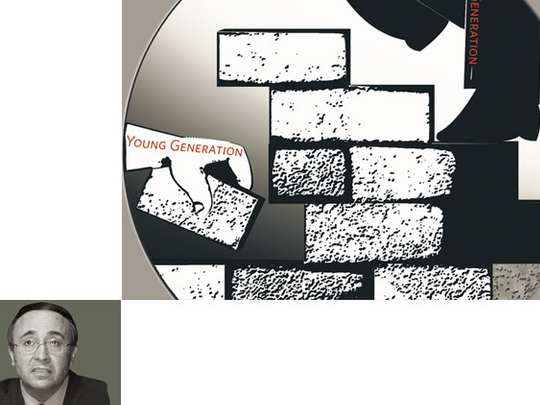
Were it not for the youth, none of the Arab revolutions would have succeeded. It is no wonder that these uprisings were called the Facebook Revolutions, as most people who took to the streets and orchestrated the uprisings through social networking websites were no older than the internet itself.
Add to that the fact that the individual who sparked the Arab uprisings was a young Tunisian called Mohammad Bu Azizi, who by immolating himself in protest against official apathy, drove Tunisians to take to the streets and end president Zine Al Abidine Bin Ali’s 23-year-old despotic rule in weeks.
We should not also forget the resounding historic words of the famous Tunisian middle-aged coffee-shop owner Ahmad Al Hifnawi when he addressed young Tunisian demonstrators in the streets saying: “This is your chance young people of Tunisia. You can do for your country much more than we could, because we have aged, we have aged for this historic moment.”
Similarly, it was next to impossible for the Egyptian revolution to succeed without the active engagement of the youth. A great chunk of the people who filled Tahrir Square for weeks on end were students and young workers. In actual fact, some of the Egyptian youth have become national icons due to their historic management and running of the revolution. Wael Ghonim has been chosen by Time magazine lately as one of the most 100 powerful people in the world thanks to his instrumental role in the
Egyptian revolution.
We all remember him weeping on television after he was freed from prison where he had been detained because of his revolutionary Twitter activities. His tears drove tens of thousands of Egyptian youth to clamour for president Hosni Mubarak’s resignation. We also remember the famous activist Asma Mahfouz and Nawwara Najm, the young daughter of the popular poet Ahmad Fouad Najm, who ignited the Egyptian street with their revolutionary enthusiasm and fervour.
And were it not for the Libyan youth who physically fought against Muammar Gaddafi’s regime, the Libyan revolution would not have succeeded.
The Syrian revolution would not have lasted this long and become one of the fiercest ever without the sacrifices made by the youth. It is worth mentioning here that tens of thousands of Syrian youth languish in prison because of their active involvement in the ongoing revolution.
It is worth noting also that the Nobel Prize was awarded to the young Yemeni female activist Tawakul Karman mainly for her great role in the Yemeni revolution.
Sadly, it now seems that these same youth have ended up the biggest losers. Instead of having new governments dominated and led by young or at least mature officials, the new rulers and officials who replaced the fallen dictators are not only old but sometimes octogenarian as was the case with prime minister Beji Caid Essebsi, who took over in Tunisia after the revolution.
It seemed then that Essebsi’s appointment was some kind of attempt to ridicule the youth movement. The octogenarian, ironically, belonged to the era of president Habib Bourguiba, who was toppled by Bin Ali.
It is, however, quite legitimate for the 60-plus president Munsif Al Marzouqi to take the job as he was even more active than the Tunisian youth against Bin Ali’s regime. Add to that the fact he and Al Nahda won the elections. So they have the people’s mandate to rule.
This is hardly the case in Egypt. A couple of weeks ago, the ruling military council chose a 76-year-old man to head the new government. What is even worse is that the new prime minister Kamal Al Ganzouri belongs to the corrupt era of Hosni Mubarak, which made some cynics presume that the council is, in fact, slapping the youth revolution in the face.
The ministers in his cabinet are elderly. The only young individual in the new Egyptian government is the deputy minister of youth and sport. Thank God, Al Ganzouri did not appoint someone from the King Farouq era to take charge of the sports ministry, a satirist noted.
Some Egyptian commentators also said sarcastically that the only reason the 67-year-old Mohammad Al Baradei did not become prime minister is because he is too young for the job.
Similarly in Libya, Yemen and Syria, it seems the young people who achieved the revolutions are out. Most of the Libyan cabinet comprises old people. It is no wonder that the young guys who took active part in the Libyan revolution protested strongly at being kept out of the new government. The prime minister managed later to include some of them in secondary positions in the ministries of interior and defence. The same applies to Yemen where the architects of the revolution hardly find a place in the new government. And when it comes to the so-called Syrian National Council, no young faces can be detected when in fact the true revolutionaries on the ground are young people.
It is quite important that the youth who spearheaded the revolutions and liberated from despotism the dinosaurs who now lead the new governments should not capitulate to the old who seem to have usurped the revolutions.
How can young people accept being governed by folk who hardly know how use a computer, let alone open a Facebook account? The future belongs to the youth, not them. Al Hifnawi’s words come to mind: ”You young men could do to your countries what we couldn’t”.
Dr Faisal Al Qasim is a Syrian journalist based in Doha.








